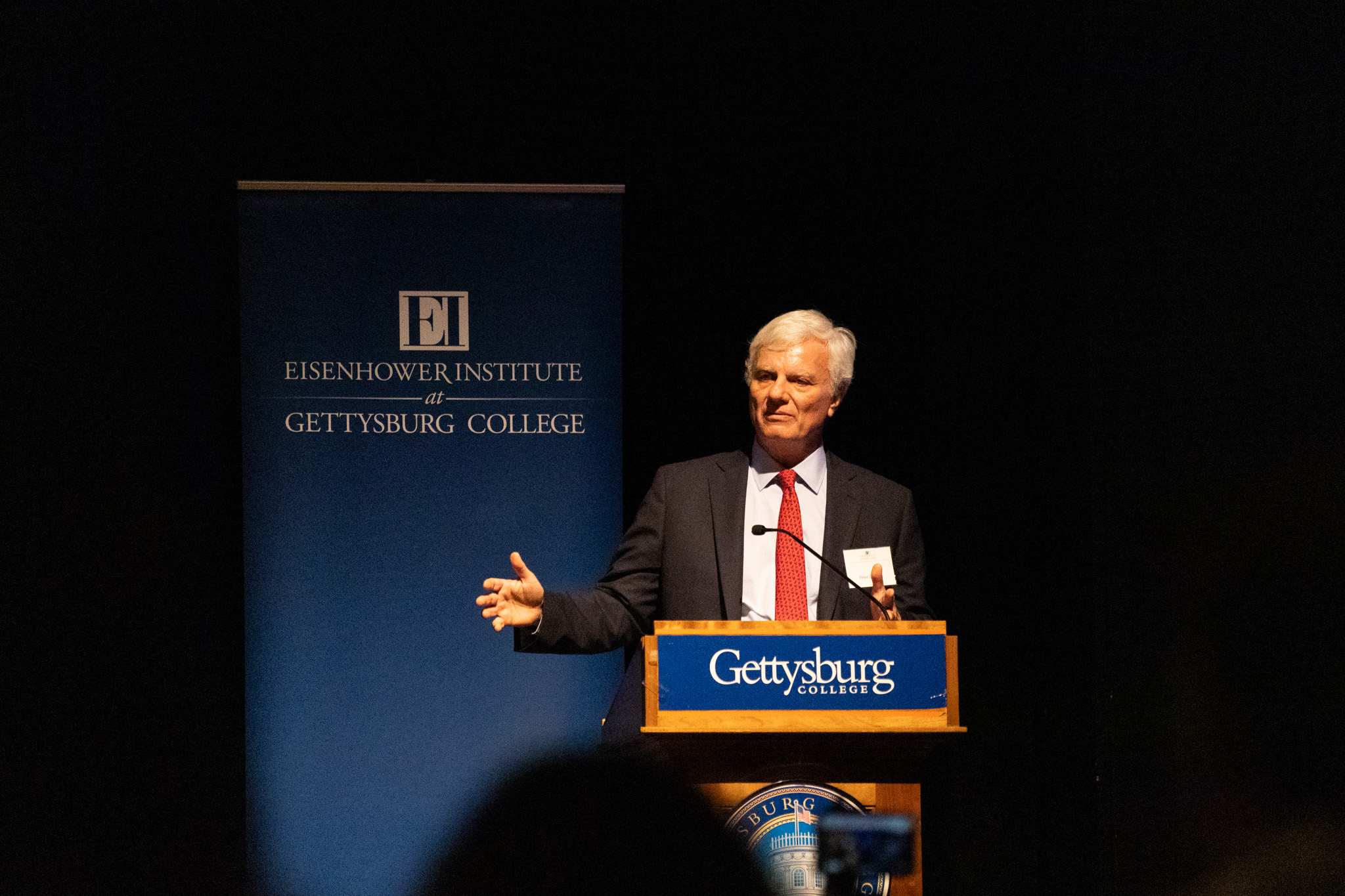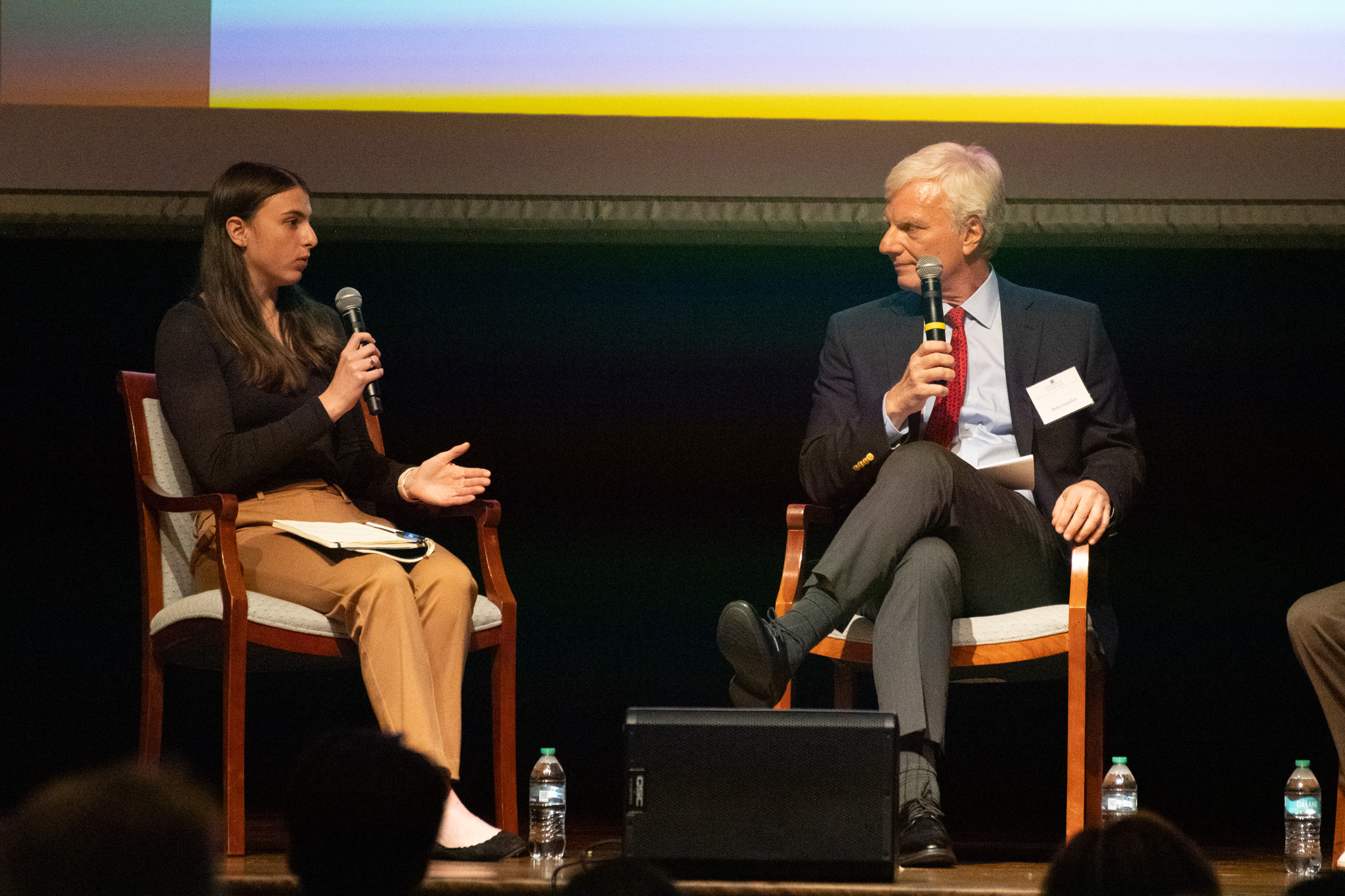Politico Journalist Reflects on Election Results During Annual Blavatt Lecture

Politico journalist Peter Canellos spoke at the annual Blavatt lecture, held the day after the 2024 election. (Grace Jurchak/The Gettysburgian)
By Vincent DiFonzo, Editor-in-Chief
The Eisenhower Institute welcomed Peter Canellos of Politico on Wednesday — one day after the 2024 election — for the annual Blavatt Lecture. This year’s lecture was called “America Has Spoken – What’s Next?”
Canellos is a career journalist who is currently working as the managing editor of enterprise (news, analysis and opinion) at Politico and is the author of multiple books, including “The Great Dissenter: The Story of John Marshall Harlan, America’s Judicial Hero.” A native of Massachusetts, he previously worked at the Boston Globe. Over his career, Canellos has overseen two Pulitzer Prize-winning projects.
After a formal dinner in the Atrium, the lecture began at 7 p.m. in the CUB Ballroom. First President Bob Iuliano spoke, welcoming attendees, thanking Canellos for speaking and thanking the Blavatt family for making the annual lecture possible.
“It’s no overstatement to say that we’re living in divisive times, and if we are going to confront the challenges of the moment as a nation and as a people, it’s going to start by the willingness of each of us to get involved and your presence here is a reflection of your willingness to take some of those steps forward students,” said Iuliano.

President Bob Iuliano speaking during the Blavatt lecture. (Grace Jurchak/The Gettysburgian)
Iuliano then welcomed Eisenhower Institute Executive Director Tracie Potts to the stage.
“It is now my honor and privilege to introduce our speaker for the evening. Peter Canellos is someone who understands politics, understands journalism, and according to Gettysburg at Gettysburg College, understands history,” Potts said, introducing Canellos.
Next, Canellos began his lecture.
“Hello, Pennsylvania… Pennsylvania… Pennsylvania. Certainly, I’ve heard a lot about you these last few weeks, and Politico reporters have been spending a lot of their time here,” Canellos said, opening the lecture and acknowledging Pennsylvania’s status as a swing state.
Canellos introduced the Constitution as the “ultimate first principle” of the country, and of historical figures Abraham Lincoln and John Marshall Harlan, a Supreme Court justice and subject of a 2021 book by Canellos.
He then posed the question of why the First Amendment separately guarantees freedom of speech and the press.
“When you think about it, if everybody already has the right to express themselves, to grab that bullhorn and enter the public square, or to get online nowadays in your computer and start posting your own opinions, why have a separate branch of freedom and protection to the press?” questioned Canellos. “I think the obvious answer there is that the framers of the Constitution, in envisioning the government and the society that we have, envisioned an institutional media as a check on power.”
Canellos argued that freedom of the press is a Constitutionally-protected part of American’s freedoms and a protection of the nation’s democratic institutions. Despite this, he reported that 127 newspapers have shut down this year so far, leaving 55 million Americans in “news deserts” — places with no local news coverage. Because of this, there has been a decrease in trust in the media, Canellos argued.
“People are getting information from all kinds of different places, and nobody really can say exactly where the source is unless you’re directly going to a reliable outlet or subscribing for a reliable outlet. But the impact isn’t the same, and the ability to hold power to account isn’t the same. And in the case of the presidential campaign, which is our focus today, the ability to get candidates to focus on the things that really matter to Americans, the most important stories, the things that they don’t want to talk about, that ability has completely eroded,” said Canellos.
He said that social media has replaced traditional media as the main news source in the country. He argued that as news spreads through social media, it gains credibility as people spread it to their friends and families, who trust each other. However, spreading information this way is “far less reliable,” said Canellos.
On the topic of the 2024 election, Canellos mentioned that President-elect Donald Trump used a number of non-traditional methods of engaging voters, such as appearing on “a ton of podcasts, and many of them were hosted by people who had somewhat dubious reputation.”
He said that many in the Trump Campaign viewed these podcast appearances as risky due to some of the podcasters reputations. During his campaign, Trump appeared on podcasts hosted by Joe Rogan, Adin Ross, Logan Paul and Lex Friedman, among others.
In his appearances, Canellos argued Trump “knew what he was doing.”
“I think [Trump] knew that people in these news deserts, people who don’t get a lot of information find trusted sources wherever they could find them, and some of these podcasters have huge audiences. So Donald Trump was able to use this system to talk directly to voters and to people who found his message all the more persuasive because it was supported by these podcasters who they really, really trusted,” said Canellos.
He warned against the spread of disinformation, the intentional spreading of false information, but also acknowledged that disinformation and misinformation did spread and will continue to spread through this election cycle.
“I think candidates have discovered in this campaign that sometimes you gain a lot by saying something that is frankly not true or is quite obviously an exaggeration. Now, many examples attach to former President Trump. There are some that attach as well to Kamala Harris,” said Canellos.
After the lecture, students Olivia Taylor ’25 and Adam Doran ’25 joined Canellos on stage for a question and answer session. Both students are Conversations for Change fellows. C4C is the College’s initiative to promote civic engagement and respectful dialogue among those who disagree, and the initiative co-sponsored the lecture. Additionally, Taylor is a Co-President of College Republicans, while Doran is the Vice President of Political Outreach for College Democrats.

Olivia Taylor ’25 asks Peter Canellos a question during the Blavatt lecture. (Grace Jurchak/The Gettysburgian)
Taylor asked the first question.
“I was thinking, ‘man, this election is going to be a long, drawn out process,’ but we knew a lot sooner than we thought we would, not just for the presidency, but for some of those key swing congressional districts and Senate seats,” Taylor questioned. “So where do you think the discrepancy between expectations and reality came from?”
Canellos mentioned how the polls were essentially tied and that many who work in media, including himself, expected the election to be decided based on mail-in and absentee ballots, which take longer to count. Because Trump outperformed the polls in this year’s results, media outlets did not need to wait for mail-in ballots to be counted to call the election, allowing the call to be made significantly earlier than the 2020 election cycle.
Other questions asked by Taylor and Doran included if a trifecta — when one party controls both houses of Congress and the presidency — contributes to political tension, if Trump’s victory will change the political dynamic of the country, what factors contributed to Pennsylvania’s flip from Joe Biden in 2020 to Trump in 2024, how impactful college students who vote in swing states are in election results and how communities can unite together after this election.
The floor was then opened for audience questions. Questions addressed whether or not Project 2025 will influence the Trump presidency and how the weakening of the Voting Rights Act will play out under the Trump presidency.
Concluding the event, Potts thanked everyone for their attendance and encouraged attendees to pick up a free signed copy of Canellos’ book, “The Great Dissenter: The Story of John Marshall Harlan, America’s Judicial Hero.”
The author of this article is also an Eisenhower Institute student employee.
